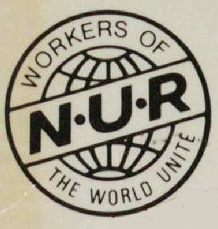Related Research Articles

The International Confederation of Free Trade Unions (ICFTU) was an international trade union. It came into being on 7 December 1949 following a split within the World Federation of Trade Unions (WFTU), and was dissolved on 31 October 2006 when it merged with the World Confederation of Labour (WCL) to form the International Trade Union Confederation (ITUC).

The National Union of Seamen (NUS) was the principal trade union of merchant seafarers in the United Kingdom from the late 1880s to 1990. In 1990, the union amalgamated with the National Union of Railwaymen to form the National Union of Rail, Maritime and Transport Workers (RMT).

The National Union of Railwaymen was a trade union of railway workers in the United Kingdom. The largest railway workers' union in the country, it was influential in the national trade union movement.

The International Transport Workers' Federation (ITF) is a democratic global union federation of transport workers' trade unions, founded in 1896. In 2017 the ITF had 677 member organizations in 149 countries, representing a combined membership of 19.7 million transport workers in all industrial transport sectors: civil aviation, dockers, inland navigation, seafarers, road transport, railways, fisheries, urban transport and tourism. The ITF represents the interests of transport workers' unions in bodies that take decisions affecting jobs, employment conditions or safety in the transport industry.
The Workers' Union was a general union based in the United Kingdom, but with some branches in other countries. During the 1910s, it was the largest general union in the UK, but it entered a rapid decline in the 1920s, and eventually became part of the Transport and General Workers' Union (TGWU).

The Irish Transport and General Workers Union (ITGWU), was a trade union representing workers, initially mainly labourers, in Ireland.
The General Federation of Belgian Labour (ABVV/FGTB) is a socialist national trade union federation in Belgium. It was founded in 1945. It is affiliated with the International Trade Union Confederation and has a membership of almost 1.2 million.
The Belgian Labour Party or Belgian Workers' Party was the first major socialist party in Belgium. Founded in 1885, the party was officially disbanded in 1940 and superseded by the Belgian Socialist Party in 1945.

The International Federation of Trade Unions was an international organization of trade unions, existing between 1919 and 1945. IFTU had its roots in the pre-war IFTU.

The involvement of the Belgian Congo in World War II began with the German invasion of Belgium in May 1940. Despite Belgium's surrender, the Congo remained in the conflict on the Allied side, administered by the Belgian government in exile, and provided much-needed raw materials, most notably gold and uranium, to the United Kingdom and the United States.
Zaïre. Revue Congolaise—Congoleesch Tijdschrift was a Belgian academic journal devoted to African studies. In particular, it focused on the region of the Belgian colonial empire.
The Belgian economic miracle was a period of rapid economic growth in Belgium after World War II, principally between 1945 and 1948. It was characterised by parallel trends of rising employment and real wages and low inflation, leading to improvements in living standards. It was roughly contemporary with the Wirtschaftswunder in West Germany and part of the period of worldwide postwar economic expansion in the late 1940s and 1950s.

The International Federation of Chemical, Energy and General Workers' Unions (ICEF) was a global union federation of trade unions.
Omer Lieven Becu was a Belgian trade unionist, who became General Secretary of the International Confederation of Free Trade Unions.
The Union of Mineworkers of Belgium was a trade union representing coal miners in Belgium.
Paul Tofahrn was a German trade union leader.
The Union of Clothing Workers and Kindred Trades in Belgium was a trade union representing workers in the clothing industry in Belgium.
Roger Dekeyzer was a Belgian trade union leader.
The Union of Belgian Metalworkers (Dutch: Centrale der Metaalindustrie van België, CMB; French: Centrale de l´Industrie du Métal de Belgique is a trade union representing workers in metal and related trades in Belgium.
The Union of Tramway and Municipal Transport Workers was a trade union representing public sector transport workers in Belgium.
References
- 1 2 3 4 "BELGISCHE TRANSPORTARBEIDERSBOND / UNION BELGE DES OUVRIERS DU TRANSPORT (1913-HEDEN)". ODIS. Retrieved 23 January 2020.
- ↑ Ebbinghaus, Bernhard; Visser, Jelle (2000). Trade Unions in Western Europe Since 1945. Basingstoke: Palgrave Macmillan. p. 130. ISBN 0333771125.